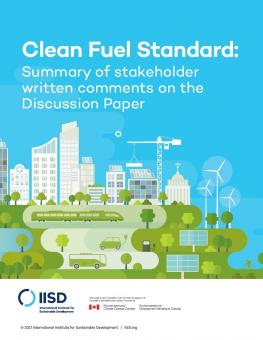
Clean Fuel Standard: Summary of stakeholder written comments on the Discussion Paper
The Government of Canada published the Clean Fuel Standard: Discussion Paper to seek stakeholder feedback and received comments from across economic sectors, environmental organizations, academia and the public.
Canada has committed to reducing its greenhouse gas (GHG) emissions by 30 per cent and developing solutions to achieve at least 80 per cent emissions reductions by 2030 and 2050, respectively, below 2005 levels.
(le français suit)
In November 2016, the Government of Canada announced that it would develop a Clean Fuel Standard (CFS) to increase the use of lower-carbon fuels and alternative technologies, such as electricity, hydrogen and renewable fuels, including renewable natural gas. The government further noted that the policy would have broad coverage and include liquid, solid and gaseous fuels in transportation, industry and buildings. The overall objective of the CFS is to achieve 30 megatonnes (Mt) of annual reductions in greenhouse gas (GHG) emissions by 2030.
The Government of Canada published the Clean Fuel Standard: Discussion Paper to seek stakeholder feedback and received comments from across economic sectors, environmental organizations, academia and the public. Overall, submissions noted strong support for the CFS and its objectives, including broad agreement on the importance of contributions from all economic sectors in emission reductions necessary to achieving Canada’s climate objectives.
Norme sur les carburants propres : Résumé des commentaires écrits des intervenants sur le document de travail
Le Canada s’est engagé à réduire ses émissions de gaz à effet de serre (GES) de 30 pour 100 d’ici 2030 et à élaborer des façons de parvenir à une réduction d’au moins 80 pour 100 des émissions d’ici 2050, sous les niveaux de 2005.
En novembre 2016, le gouvernement du Canada a annoncé qu’il allait mettre au point une norme sur les carburants propres (NCP) dans le but d’augmenter l’utilisation de carburants à faible teneur en carbone et des technologies de emplacement, notamment l’électricité, l’hydrogène et les carburants renouvelables, y compris le gaz naturel renouvelable. Le gouvernement a en outre énoncé que la politique aurait une portée très large de façon à inclure les carburants à l’état liquide, solide et gazeux utilisés dans les transports, le secteur industriel et le secteur du bâtiment. La NCP devrait permettre de réduire annuellement les émissions de GES de 30 mégatonnes (Mt) d’équivalent en dioxyde de carbone d’ici 2030.
Le gouvernement Canada a publié le document ayant pour titre Norme sur les carburants propres : Document de travail pour obtenir les réactions des intervenants et les commentaires provenant des différents secteurs économiques, des organismes non gouvernementaux, du monde universitaire et de la population en général. Dans l’ensemble, on a observé un fort soutien pour la NCP et ses objectifs, car on s’entend notamment sur l’importance de la contribution de tous les secteurs économiques dans la réduction des émissions nécessaire pour atteindre les objectifs du Canada en matière de changements climatiques.
Participating experts
Additional downloads
You might also be interested in
Powering the Clean Energy Transition: Net-Zero electricity in Canada
This brief explains how a shift to clean power generation can offer affordable, reliable electricity, benefiting households and businesses alike.
IISD Welcomes Draft Regulations for Oil and Gas Pollution Cap
A firm cap on emissions can provide certainty for industry to invest in decarbonization, while ensuring the sector is on a path to net-zero by 2050.
For Nature-Based Solutions to Be Effective, We Need to Work with Indigenous Peoples and Local Communities
Nature-based solutions have been praised as a promising approach to tackling the twin crises of climate change and biodiversity loss. But some Indigenous Peoples and local communities are questioning the legitimacy of the concept and what it symbolizes. It is time to listen to what they have to say.
How Fossil Fuels Drive Inflation and Make Life Less Affordable for Canadians
New report takes closer look at how Canada’s dependence on fossil fuels impacts energy costs and prices of essentials such as transportation, home heating, and housing.